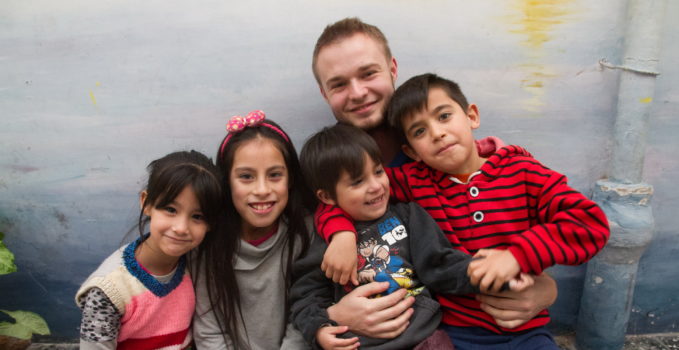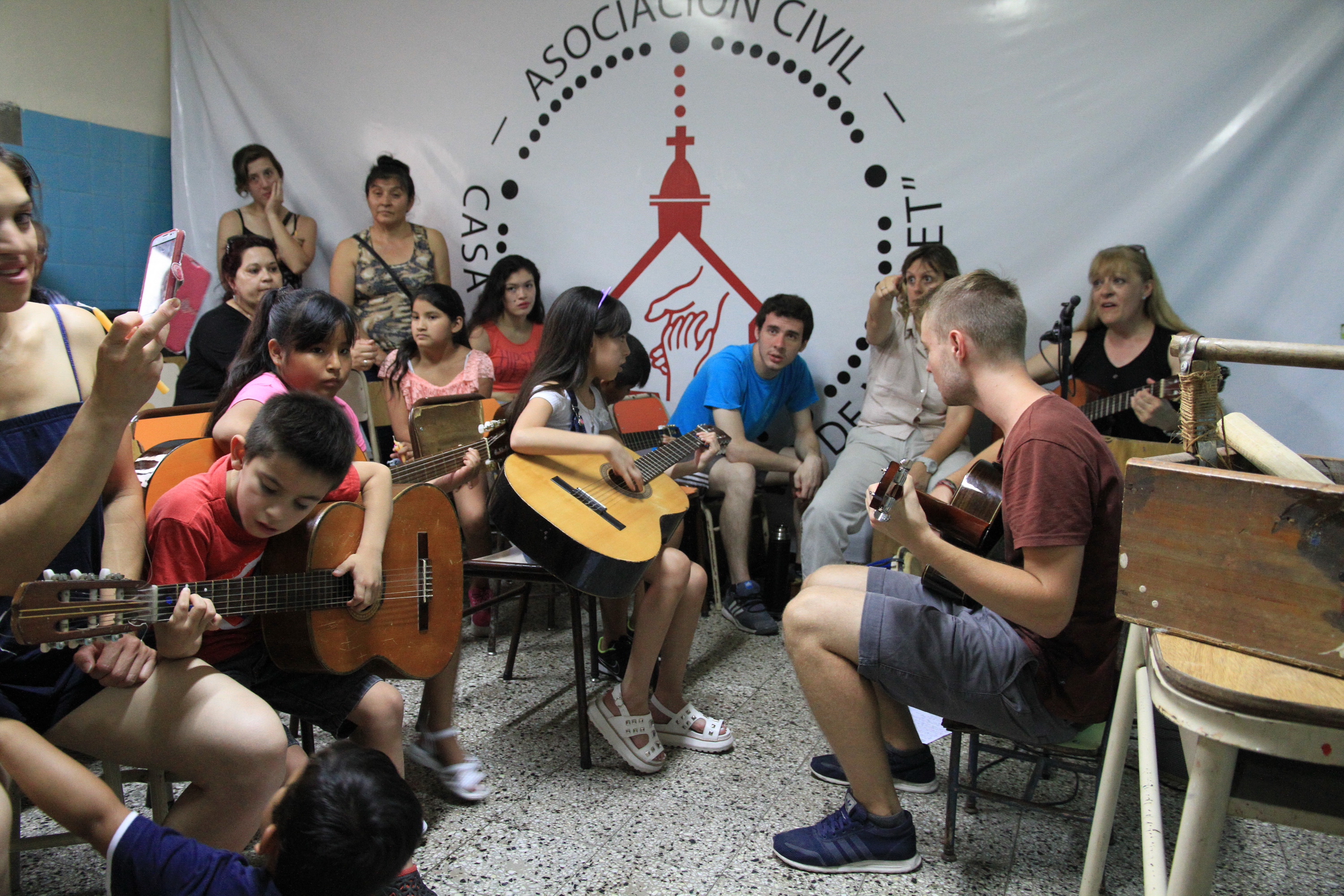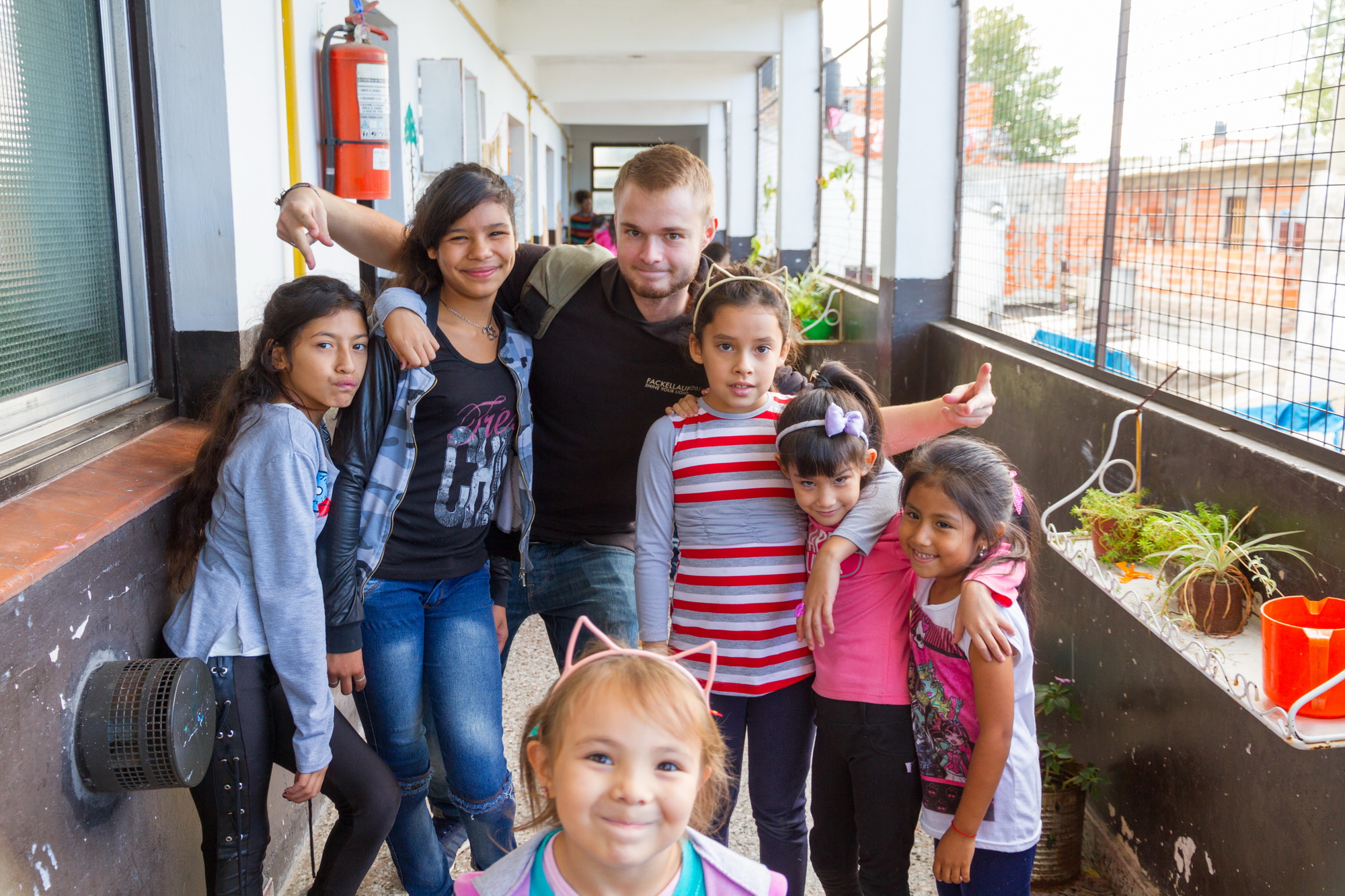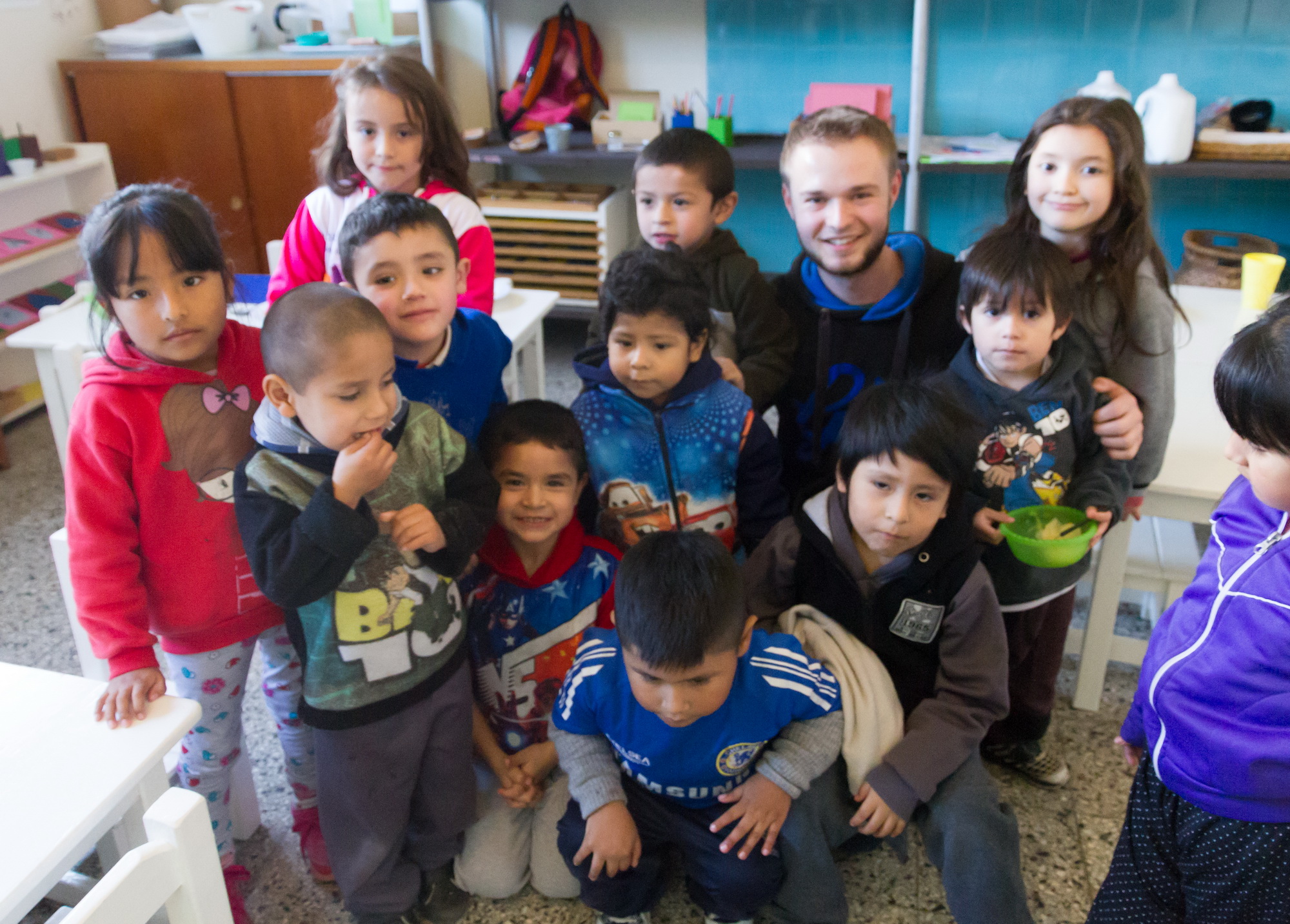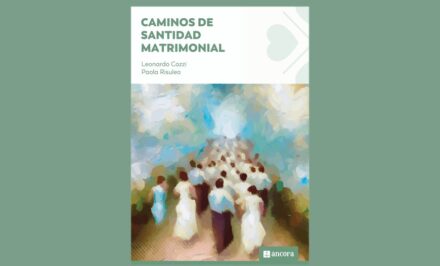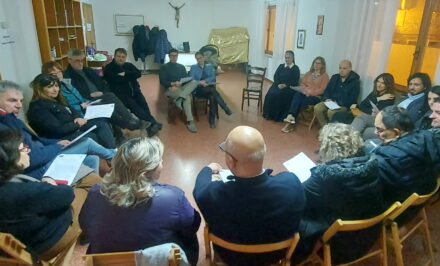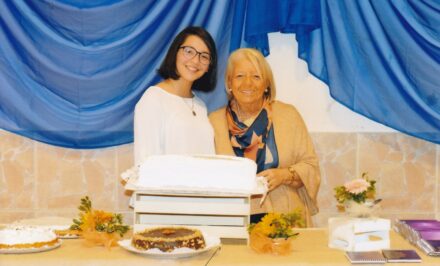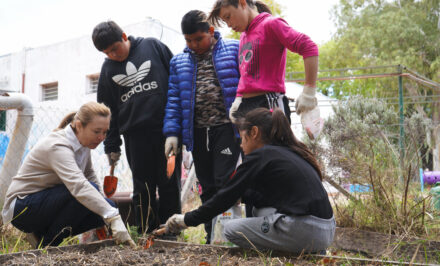Interview with Matthias Gross, Germany, Volunteer at Casa del Niño in Villa Ballester •
Matthias Gross volunteered at Casa del Niño in Gran Buenos Aires from August 2016 to August 2017. The Casa is located near the Schoenstatt Daughter Shrine in the Villa Ballester district and is a Schoenstatt Family project, the Family Federation and the Campaign of the Pilgrim Mother are the primary sponsors.
Father Kentenich visited Villa Ballester several times, because many German immigrants found housing there after the Second World War. This is the place, where the founding of Argentinean Schoenstatt took place, and also where Father Kentenich gave several lectures. It was here with Family Vallendor that the precursor to the home shrine was created, and it is here where we find the Casa del Niño, a Day Care Center for children from the adjoining “villa”, as the slum areas are called in Argentina. Foreigners (and therefore also German volunteers) should only enter with supervision. The drugs-related crime in the “villa” does not allow foreigners to travel safely even by day through the narrow, dirty streets. The Schoenstatt family in Villa Ballester lives the phrase, “From the Shrine to the Poor,” (by Joao Pozzobon) very concretely. Father Horacio Sosa (+ 2007) always said at social seminars of the Argentinean Schoenstatt Movement, that Father Kentenich wanted each and every Schoenstatt Shrine to not only be a training center, but also a home of social commitment. This was definitely true in Villa Ballester.
Father Hans-Martin Samietz from Germany, who had facilitated this exchange, conducted an interview with Matthias Gross during his visit to South America in June 2017. It bears witness to a deep bond with the teachers in the Casa. The Schoenstatt movement in Ballester gives children and their families, who are growing up in the neighboring slum district, a sense of affection with this project. Although there is the expectation that most of the children who visit the Casa will remain “stuck” in their home district, they now know others outside their neighborhood that wish them well. This could mean that at some point a person there could rise up out of the disregard … and why not, to transform this quarter?
FHM: It was always your dream to go abroad. How did that wish come into focus for you?
MG: I always liked the idea somehow to use the time after finishing my Abitur (high school). In general, I also did not really know what I wanted to do afterwards. So that was it: to get to know a new culture. I had access more or less to South America. I got to know a bit of the culture through my girlfriend and her family. And also in general – Spanish! I really liked Spanish music, and I listened to it a lot. And then the continent was already relatively clear. But I think in the beginning the plan was more like that – a half-year because somehow a year sounded so long. But in retrospect, I’m glad it was not only half a year. After half a year, you really kind of find yourself, get engrained in everyday life and really start living. The second half-year is much more intense than the first one, at least that’s what I experienced.
I do not know at exactly what point I decided to make it a year. I have a lot of buddies who were also abroad and only spoke about it positively.
FHM: Some organizations make it two years. Would you make it two years? Or would you have decided for two years knowing what you now know today?
I would not have gone for two years with the knowledge I had before. It would depend…for example, if I was not with my girlfriend, then I could imagine it. Now at the end of the year, on the one hand, I would like to go home, but on the other it would be theoretically perfect, if I could somehow go home for a short time and then come back again, simply to have a little break. As I really like it extremely well here. In addition, I would also like to see old friends and just spend time experiencing everyday life at home again.
FHM: What do you miss the most?
MG: Hmm …There are a lot of things. They are not even really big things. The German way is much more organized in many ways and makes it much easier to live, because you are just used to it. Then clearly the food here is awesome, but nevertheless, things like Doner(Kebab) or German beer are already hard to beat (laughs). These will be some of the first things I will eat when I get back to Germany.
Otherwise, sure I miss my girlfriend, my family, but also the things, which I have in my room, simply to have my own space.
(thoughtful pause)
And generally to have more possibilities: I have so many possibilities in the house I live in with my parents. For example, I like to build things, or be creative and do stuff. And, here it is very difficult, because I have no materials from which I can make things from, no tools or such things. And yes, I am looking forward to simply having those possibilities again.
FHM: And what would you say, that you have won for yourself through completing the year?
MG: That is quasi – THE question – (laughs).
FHM: THE QUESTION! (laughs) Why do you like being here? Perhaps that is easier to answer.
MG: Yes, it is easier to answer. So I really do like it extremely well here. The workday is unbelievably fun, because we have a crazy nice and friendly team at Casa del Niño, with whom it’s totally fun to work. It actually happened quite fast to working as friends, and it will also be really hard to leave that behind me. Working with the kids is really nice and is a lot of fun, and you can show them a bit of the things you can do. Even when giving guitar lessons in Spanish without any great knowledge of Spanish is really um…interesting (laughs).
Then we have insanely good friends just around the corner. There are also a very great couple, our mentor and her husband, that are always there for us and are a perfect support. I have also really gotten to know the culture. Drinking ‘mate’ [herbal tea] and on Sunday’s ‘Asado’ with friends has just become a part of my everyday life. And I really would not have wanted to miss that. These are some of the reasons I like being here.
FHM: Describe the project in which you are working from your prospective.
MG: Casa del Niño is a day home for school children in the mornings, for children coming to Casa del Niño from the adjoining quarter or villa – which is the term used in Argentina for ghetto or slum district. The kids come to us to get breakfast, then afterwards (homework) support or workshops, and lunch at noon, so that they can go to school afterwards.
In addition, it is important to say that the children get not only food for themselves in the Casa, but also food for their families, so that at lunch or in the evening, the whole family still has something to eat. That means the approximate amount of people from the Casa del Nino is over 100 people.
We, volunteers, are responsible for helping the children with their homework, doing workshops (guitar and repair shop) and helping the cook in the kitchen. Then of course, things that just happen daily: we help put away any food supplies or clothing donations that may come in, clean up the storage areas, things like that. Women mostly run the daycare meaning that the young men who can carry stuff or simply do heavy things is pretty practical.
Other than that, I also give guitar lessons as previously mentioned. I started at the beginning of the year, as I had the opportunity to do so using the four guitars in the project. I thought it was a nice thing to be able to give to them. Also Pablo, another volunteer, works in carpentry and works there with the children twice a week. They make puzzles, small things from wood for their mothers – what else? – Clothing hooks, just such small things that the children can finish in an hour or two and are able to saw or put together.
The only thing with the Casa is that it is not really a “staircase project” in order to help the children get out of the slum, but rather is more of a parallel world. This is still quite nice, but the question is, what percentage of those who come today will not end up later like their parents? This is the part that somehow pains me. The children have so much potential, and such great desire to do things, but through their housing situation, the social situation in the neighborhood, it is really damn difficult to somehow get out. The Casa simply does not have the personnel and financial resources to make it into a more comprehensive “staircase project.”
FHM: Why is your work meaningful? Do you have any doubt that it makes sense?
MG: No, by no means have I ever doubted that this institution is meaningful. If only, because, the children are fed there. Even if it would only be a drop on a hot stone, which I do not believe, it is still a drop. And I will say this, the children are at least partially out of the villa structure during the ages of 3 to 14 years old and at least once saw that there was a way out. They see, there is another world, outside of their barrio, without the drugs, and the violence. They also learn some Schoenstatt education and are raised sensibly with the transmission of basic Christian and moral values. I would say that there is work being done to raise the children right, moral principles, one apologizes, one says “thank you”, “please,” such completely normal things that are not given in their environment. They learn these things (hopefully) in the Casa. In any case, it is a big step. The project is definitely useful.
FHM: What did you notice about the Schoenstatt education in the Casa?
MG: For example, the kindergarten is led using Montessori pedagogy. I would say the Schoenstatt pedagogy is at least in part anchored in the Montessori pedagogy. Then the teachers or caregivers, I believe all, but definitely most of them are with Schoenstatt and live this also in the Casa.
We were also at the team meeting the last time and it was clearly once again said that the great sense of this Casa is to give the children love, just to be there for them and to fulfill their every wish. Just to be the opposite of what they normally experience, that they are repelled and rejected and so forth. That is why Laura (the boss) has stopped us at times from really scolding the children, but always to be positive and give positive feedback. It seemed to be exaggerated at first to me. But then I understood it at some point that there is always an open-arms mentality there.
I believe it is like this: we just give them so much love that it is enough to get then through the afternoon (laughs). That is what the way of thinking behind it is. And that’s nice to see. This is also the case in Schoenstatt and Schoenstatt pedagogy, simply to love the children so much and to accept them as they are. It is quite beautiful to see.
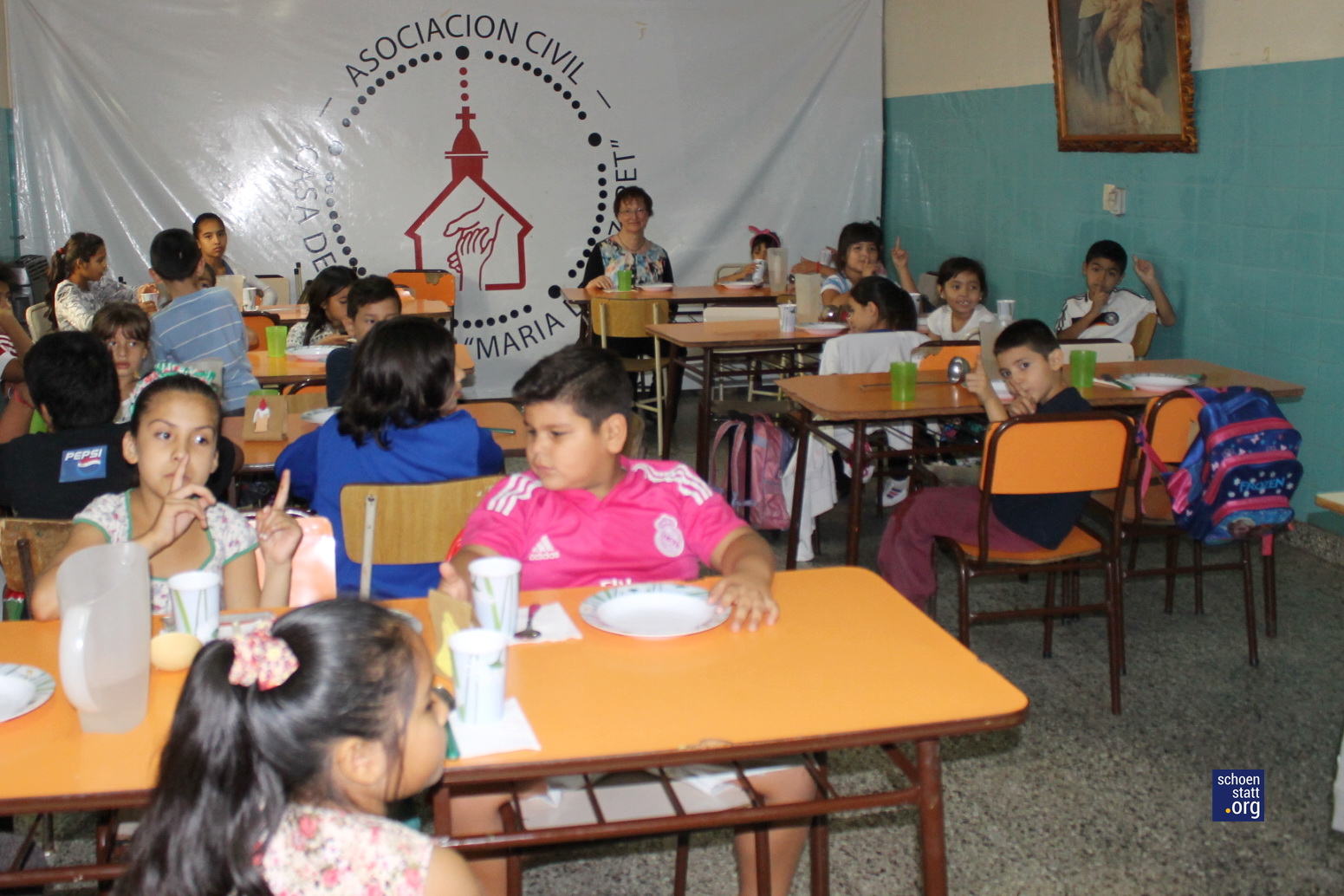
FHM: How would the Casa run without you volunteers? What would be different? What may not even be noticeable?
MG: Well, there would definitely not be the ability to offer guitar and carpentry workshops. That is clear. A lot of extra things would quite simply fall away. I think the basic structure would more or less skim through, but it would be much more difficult.
The logistical things would not be so simple. There is also more or less now a special situation, because a teacher has been sick for several months. And we jump in and pick up the extra work that would otherwise be distributed on the little staff. We are certainly a help.
I also believe the fact that boys come to the Casa as volunteers through the program “my way” is a big plus because the children have a really very disturbed picture of a father figure or male image generally from their brothers, uncles and so on from home. We are really doing pioneering work to show examples of what a big brother really is. For the kindergarten children, we are partly also a father figure. We show them what might be typical of a figure, such a male leader. Many have never had this.
FHM: If you could make a farewell gift yourself using carpentry or something other technic, what would you make for the Casa?
MG: For the whole Casa?
FHM: Yes.
MG: Oh, God, I’m really bad at bringing souvenirs and giving gifts.
(thoughtful pause)
I don’t know, something useful, that the children could have fun with, something for them to remember me by, or something that they could use to continue what we started here.
(thoughtful pause)
For example, I am guessing the guitar lessons will stop after I’m gone.
(thoughtful pause)
Yes, if I could, I guess I would build guitars that I could give to the kids. We are not allowed to give the guitars to the children to take with them. We have four guitars, and they belong to the Casa. And it is just more or less clear that these guitars would not show up again, if we gave them up because the children have no private place or space where they could lock them up. The children only practice half an hour in the Casa once a week without their own guitar at home. Therefore their progress is minimal. Also, I think music is really important. For me, music is extremely important, and I could imagine that many children who, if they had the opportunity to play an instrument on a regular basis, would simply create something of their own, define themselves, and develop a bit of their personality. That is the way it is for me. It is not only somehow the music, meaning so now I play an instrument, but it is somehow also a tool, to express myself. If I could, I would just make them all guitars or small ukuleles, because that’s easier to play.
FHM: I think you still have a lot to say, but we’ll have to come to an end here. Many Thanks!
MG: Ok, yes absolutely no problem!
More information and reports can be found at mein-weg.org and facebook.com/MeinWeg.schoenstatt (German)) or with Father Hans-Martin Samietz +49 151 58 50 11 92.
If you would like to support the Casa del Niño – simply use the donation button via credit card, direct debit or PayPal.
Original: German, 13.09.2017 . Translation: Lindsay Burger, Munich, Germany Edited: Melissa Peña-Janknegt, Elgin, TX USA


